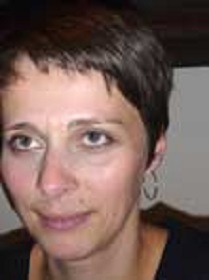De Indisch-Britse schrijver en essayist Salman Rushdie werd geboren in Bombay op 19 juni 1947. Zie ook alle tags voor Salman Rushdie op dit blog.
Uit:Luka and the Fire of Life
“There was once, in the city of Kahani in the land of Alifbay, a boy named Luka who had two pets, a bear named Dog and a dog named Bear, which meant that whenever he called out “Dog!” the bear waddled up amiably on his hind legs, and when he shouted “Bear!” the dog bounded towards him wagging his tail. Dog the brown bear could be a little gruff and bearish at times, but he was an expert dancer, able to get up on to his hind legs and perform with subtlety and grace the waltz, the polka, the rhumba, the wah-watusi and the twist, as well as dances from nearer home, the pounding bhangra, the twirling ghoomar (for which he wore a wide mirrorworked skirt), the warrior dances known as the spaw and the thang-ta, and the pea cock dance of the south. Bear the dog was a chocolate Labrador, and a gentle, friendly dog, though sometimes a bit excitable and nervous; he absolutely could not dance, having, as the saying goes, four left feet, but to make up for his clumsiness he possessed the gift of perfect pitch, so he could sing up a storm, howling out the melodies of the most popular songs of the day, and never going out of tune. Bear the dog and Dog the bear quickly became much more than Luka’s pets. They turned into his closest allies and most loyal protectors, so fierce in his defence that nobody would ever have dreamed of bullying him when they were nearby, not even his appalling classmate Ratshit, whose behaviour was usually out of control.
This is how Luka came to have such unusual companions. One fine day when he was twelve years old, the circus came to town – and not just any circus, but the GROF or Great Rings of Fire itself, the most celebrated circus in all of Alifbay, “featuring the Famous Incredible Fire Illusion.” So Luka was at first bitterly disappointed when his father the storyteller Rashid Khalifa told him they would not be going to the show. “Unkind to animals,” Rashid explained.
“Once it may have had its glory days but these days the GROF has fallen far from Grace.” The Lioness had tooth decay, Rashid told Luka, and the Tigress was blind and the Elephants were hungry and the rest of the circus menagerie was just plain miserable.”

De Nederlandse dichter en schrijver Sybren Polet (pseudoniem van Sybe Minnema) werd geboren in Kampen op 19 juni 1924. Zie ook alle tags voor Sybren Polet op dit blog.
De man van 40+
Op zijn hoofd heeft hij ongeveer
100.000 haren. Zijn bloedvaten zijn 20.000
meter lang en er stroomt
6 liter bloed door.
Hij beschikt over 750 spieren en 222
botten. In zijn lichaam zit genoeg fosfor
om 60.000 lucifers mee te maken, vet
voor 50 kaarsjes, ijzer voor 10 duim-
spijkers en 20 volle lepels keukenzout.
Naast sporen goud en zilver
bevat hij voorts voldoende glycerine
om 15 kilo springstof van te maken.
Totaalwaarde anno 1969 van Mr.X,
volgens de amerikaanse biochemicus Donald Forman:
f 12,67 (Sinds zijn jeugd ruim 9 gulden
in waarde gestegen)
Toch zal er,
aldus de Volkskrant, eerst een forse goudader
in zijn lichaam ontdekt moeten worden
voordat er wat minder lichtzinnig
met zijn leven zal worden omgesprongen.
P.S. De conclusie van de Volkskrant is onjuist:
Wanneer er een forse goudader in zijn lichaam
ontdekt zou worden, zou zijn leven
geen ogenblik veilig zijn.
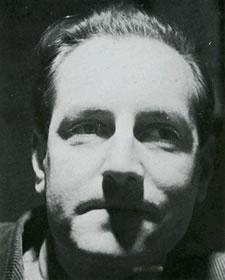
De Tsjechische schrijver Josef Nesvadba werd geboren op 19 juni 1926 in Praag. Zie ook alle tags voor Josef Nesvadba op dit blog.
Uit: Horribly Beautiful, Beautifully Horrible
“When I approached the queue it became clear that the guards were doing their job mechanically, without paying much attention. Now and then they would examine a bag or reach into a pocket if something aroused their suspicions, but their efficiency was limited by the fact that each of them had only one arm. At first, I thought they must be casualties of the recent war of destruction. I selected out an old man who was riding on a donkey, and tried to slip into the town with him, half-hidden by the animal, but it didn’t work:
“Stop!”
I felt the edge of a blade upon my neck. The guard who had stopped me was about 50 years old. His left eye was twice as big as the right, and he had a wooden leg. He limped with me to a nearby guardroom. I noticed a big drum and trumpet near the entrance, apparently for summoning help in emergencies. How could such primitive equipment exist alongside the holorays of the Curtain? Had they lost the expertise which had produced the Curtain so soon?
The guard shoved me forwards. I tried to limp the way he did, hoping to attract sympathy by the ploy — and also to conceal from him the fact that I could run away any time I wanted. When we entered the guardroom he locked the door through which we had come and indicated that I should wait. His manner wasn’t at all menacing. He behaved like someone who was thoroughly bored by his job. He slowly detached his armour, having first laid down his sword and shield in a corner. Then he opened another door, which led to an inner room.
The room was all white. Lots of sharp instruments hung on the walls, some of which were utterly unfamiliar to me. I felt someone touch my neck, tenderly, on the same spot where the blade had touched me before. I had to turn around. Evidently there was a tiny would on my neck, and the woman who had touched me was a nurse. She was horrible; I had never seen anyone so horrible in my entire life. I suppressed a cry of disgust.”
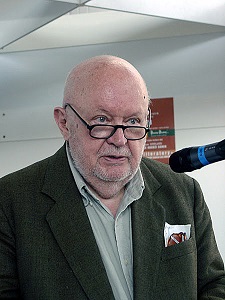
De Japanse schrijver Osamu Dazai (eig.Shūji Tsushima) werd geboren op 19 juni 1909 in Tsugaru. Zie ook alle tags voor Osamu Dazai op dit blog.
Uit: No Longer Human (Vertaald door Donald Keene)
“What, I wondered, did he mean by “society”? The plural of human beings? Where was the substance of this thing called “society”? I had spent my whole life thinkng that society must certainly be something powerful, harsh and severe, but to hear Horiki talk made the words “Don’t you mean yourself?” come to the tip of my tongue. But I held the words back, reluctant to anger him.
‘Society won’t stand for it.’
‘It’s not society. You’re the one who won’t stand for it – right?’
‘If you do such a thing society will make you suffer for it’
‘It’s not society. It’s you, isn’t it?’
‘Before you know it, you’ll be ostracized by society.’
‘It’s not society. You’re going to do the ostracizing, aren’t you?’
Words, words of every kind went flitting through my head. “Know thy particular fearsomeness, thy knavery, cunning and witchcraft!” What I said, however, as I wiped the perspiration from my face with a handkerchief was merely, “You’ve put me in a cold sweat!” I smiled.
From then on, however, I came to hold, almost as a philosophical conviction, the belief: What is society but an individual?”
(…)
“I also have the impression that many women have been able, instinctively, to sniff out this loneliness of mine, which I confided to no one, and this in later years was to become one of the causes of my being taken advantage of.”
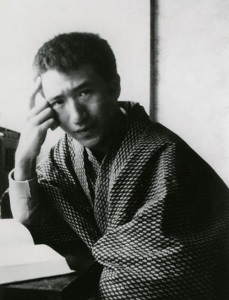
De Filippijnse dichter en schrijver José Rizal (eig. José Protacio Rizal Mercado y Alonso Realonda) werd geboren op 19 juni 1861 in Calamba. Zie ook alle tags voor José Rizal op dit blog.
Hymn to Labor
For the Motherland in war,
For the Motherland in peace,
Will the Filipino keep watch,
He will live until life will cease!
MEN:
Now the East is glowing with light,
Go! To the field to till the land,
For the labour of man sustains
Fam’ly, home and Motherland.
Hard the land may turn to be,
Scorching the rays of the sun above…
For the country, wife and children
All will be easy to our love.
(Chorus)
WIVES:
Go to work with spirits high,
For the wife keeps home faithfully,
Inculcates love in her children
For virtue, knowledge and country.
When the evening brings repose,
On returning joy awaits you,
And if fate is adverse, the wife,
Shall know the task to continue.
(Chorus)
MAIDENS :
Hail! Hail! Praise to labour,
Of the country wealth and vigor!
For it brow serene’s exalted,
It’s her blood, life, and ardor.
If some youth would show his love
Labor his faith will sustain :
Only a man who struggles and works
Will his offspring know to maintain.
(Chorus)
CHILDREN:
Teach, us ye the laborious work
To pursue your footsteps we wish,
For tomorrow when country calls us
We may be able your task to finish.
And on seeing us the elders will say :
“Look, they’re worthy ‘f their sires of yore!”
Incense does not honor the dead
As does a son with glory and valor.
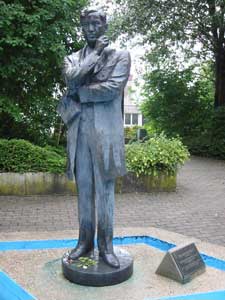
Standbeeld in het Rizal Park in Wilhelmsfeld, Duitsland
De Duitse dichter en schrijver Friedrich Huch werd geboren op 19 juni 1873 in Braunschweig. Zie ook alle tags voor Friedrich Huch op dit blog.
Uit: Peter Michel
„Herr Michel übernahm alles mit der größten Ausdauer und sagte nur manchmal: »Aber nein! Wirklich? Was doch alles in der Welt vorgeht!« Dann steckte er die Enden seines spärlichen Schnurrbartes in die Mundwinkel und sah nachdenklich vor sich hin. Peterchen schwieg dann erschüttert mit, blickte auf seinen Vater – und dessen gesicherte Unangreiflichkeit gab ihm selbst eine innere Festigkeit und Ruhe: Er fühlte sich geborgen. Solche Szenen ereigneten sich übrigens niemals im Beisein der Mutter oder des Großvaters. Frau Michel besaß einen sicheren Instinkt, Betrügereien zu durchschauen, nachdem sie sich im ersten Augenblick hatte verblüffen lassen. Und der Großvater – Frau Michels Vater – genoß bei dem Pastor und dem Schulzen noch dieselbe Ehrfurcht wie vor Jahren, als er den Rohrstock über ihnen schwang.
Die Erziehung des Kindes Peter lag fast ausschließlich in den Händen der Mutter. Herr Michel war ein reines Kind, wo es sich um Lebensfragen handelte. – Eine Eigenschaft war beiden Eltern ihrem Sohne gegenüber gemeinsam: die der vollständigen Ehrlichkeit. Frau Michel log bloß manchmal heimlich ein wenig, wenn sie genau wußte, daß es niemand merken konnte, und wenn sie einen nicht schlimmen Zweck damit verband. Herr Michel, welcher keine Zwecke kannte, log nie. So wuchs das Kind im felsenfesten Zutrauen auf die Welt heran.
Mit aller natürlichen, hausbackenen Aufgewecktheit verband Frau Michel aber eine Eigenschaft, die ihr oft schadete: ihre verwundbare Stelle war die Eitelkeit. Durch Schmeicheln konnte man alles von ihr erlangen. Merkte sie dann aber einmal, daß man sie ausgebeutet hatte, so ging ihr Temperament vollkommen mit ihr durch. In ihrer Kleidung war sie etwas auffallend und nicht sehr geschmackvoll. Das eigentliche Zartgefühl ging ihr ab, und auch von Gemüt hatte sie soviel wie nichts. Peter, der in beidem mehr dem Vater nachschlug, fand in ihm eine verwandtere Natur und schloß sich ihm mehr an als seiner Mutter.“
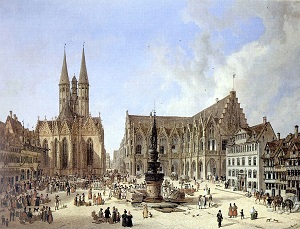
Braunschweig,“ Altstadtmarkt von Osten“ door Domenico Quaglio, 1834
De Duitse dichter, schrijver en pastor Gustav Schwab werd geboren op 19 juni 1792 in Stuttgart. Zie ook alle tags voor Gustav Schwab op dit blog.
Uit:Schiller’s Leben
„So kühne Hoffnung dürfen wir von Erforschung des Geschlechtes schwäbischer Dichter freilich nicht hegen. Die Kirchenbücher der württembergischen Dörfer namentlich gehen wohl insgesamt nicht bis zur Reformation herab, sehr viele sind nach der Nördlinger Schlacht von den Kaiserlichen zerstört worden. Doch ist es dem Verfasser dieser Lebensbeschreibung durch die Gefälligkeit zweier Pfarrämter gelungen, den Mannsstamm Schillers mit ziemlicher Wahrscheinlichkeit bis ins siebente Glied rückwärts und in die Mitte des sechzehnten Jahrhunderts zu verfolgen.
Schillers Vater, Johann Kaspar Schiller, ist zwei Stunden nördlich von der Ghibellinenstadt Waiblingen und in ihrem Oberamte, zu Bittenfeld (nicht Bitterfeld) einem altwürttembergischen Pfarrdorfe von etwa tausend Einwohnern am 27. Oktober des Jahres 1723 geboren: dessen Vater, der Großvater des Dichters, hieß Johannes Schiller, war Schultheiß des Dorfes und Bäcker, und am 20. Oktober 1682 zu Bittenfeld geboren; heirathete am 30. Oktober 1708 eine Bewohnerin des Dorfes Altdorf, Eva Margaretha Schatzin, und starb am 11. Juni 1733. Der Vater des Johannes, der Urgroßvater des Dichters, hieß, wie der Enkel, Johann Kaspar Schiller, war Mitglied des Gerichts und, wie sein Sohn, ein Bäcker. Seine Gattin hieß Anna Katharina. Er starb 37 Jahre 8 Monate alt am 4. September 1687. Dieser ist im Tauf- und Kopulationsbuche Bittenfelds nicht zu finden, und er soll von Großheppach nach Bittenfeld gezogen seyn.
Wir wenden uns also nach diesem stattlichen Dorfe des weinreichen Remsthals, das gleichfalls im Waiblinger Oberamte und eine kleine Meile südöstlich von der Stadt Waiblingen gelegen, etwa 1400 Einwohner zählt und durch die Zusammenkunft der Helden Marlborough, Prinz Eugen und Markgraf Ludwig von Baden im dortigen Wirthshause zum Lamm am 9. Junius des Jahrs 1704 eine geschichtliche Illustration erhalten hat.”
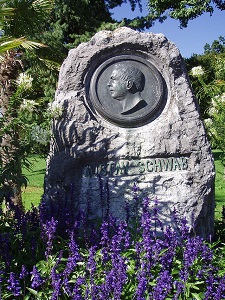
Gedenksteen in Friedrichshafen
Onafhankelijk van geboortedata:
De Duitse dichteres Claudia Gabler werd in 1970 geboren in Lörrach. Zie ook alle tags voor Claudia Gabler op dit blog.
Pioniere der Reprogrammierung als Fremdbild
Pioniere der Reprogrammierung als Fremdbild.
die eilig herbeigerufenen Abteilungen machten Differenzen
für uns. zwischen gefühlter und gelebter Stadt lagen
ihre temporären Gebäude. Abwanderung galt also als Geschäft,
aber man untersuchte trotzdem das Kranke dieser Klischees.
ein riesiges Spektakel nahm seinen Lauf, meine wilden Haare
waren dahin (verloren zwischen den Bezügen). Epochenwechsel
im Gespräch wurde zu meinem ganz persönlichen Crossover,
der Kaffee auf den Laken war dann schon wieder lustig.
aber wir sehen natürlich die Fähnchen flattern am Stadtrand.
wir streuen Zucker in den Kakao und unsere Flächennutzung
wird augenblicklich revitalisiert. die Thermohose
und ihr positives Verhältnis zu Feuchtigkeit. um die Hüften
herum graduelle Verdichtung wie liest man
wie liest man die Wolken nochmal in der Urbanität?
